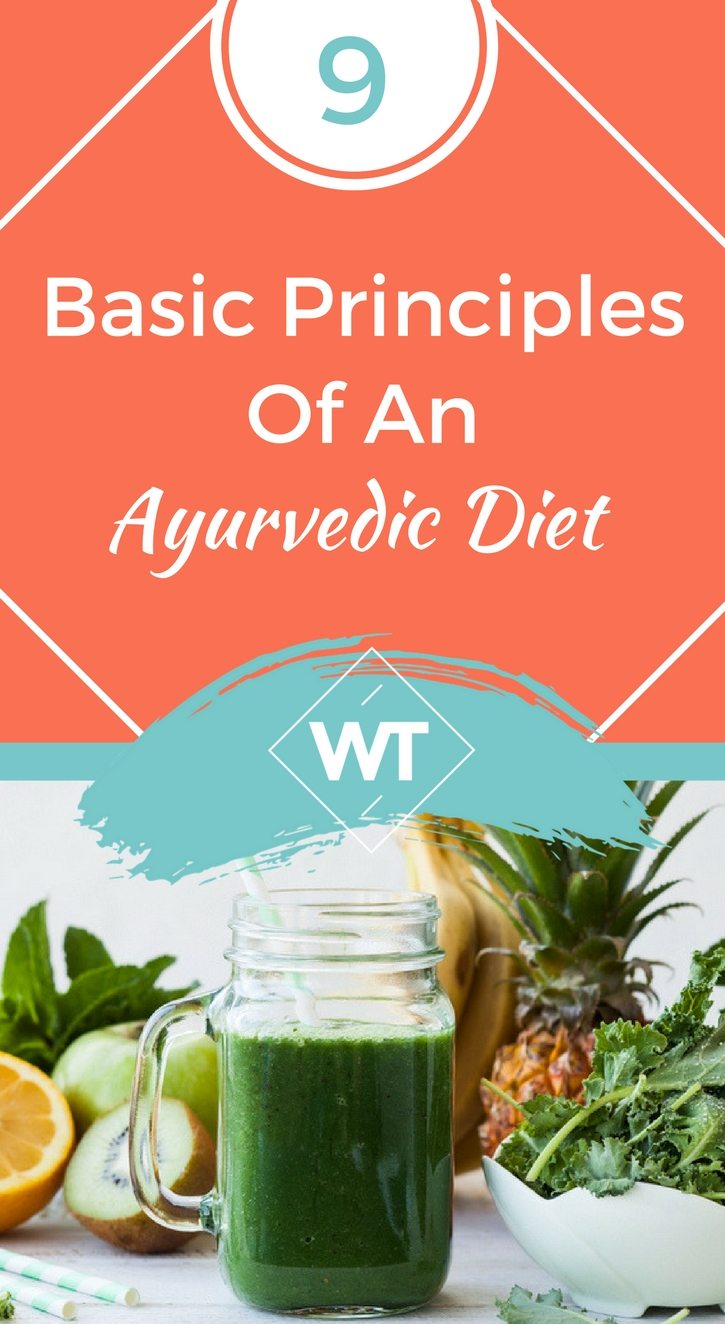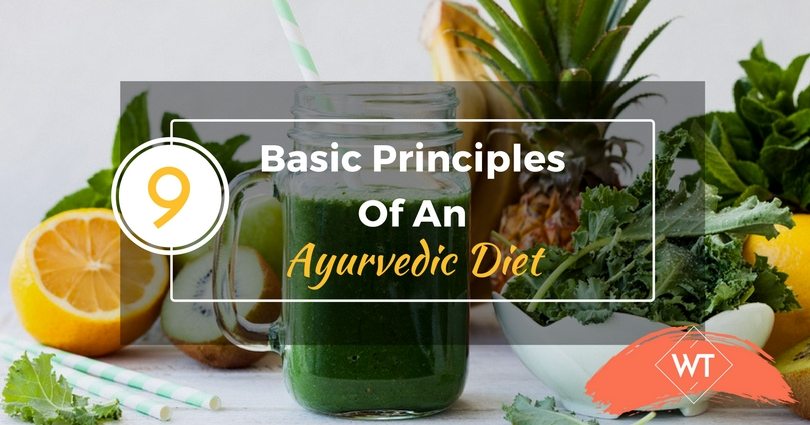9 Basic Principles Of An Ayurvedic Diet

Amongst the main driving forces that influence the health of our bodies, diet and nutrition are tremendous. Food can be a powerful medicine or a harmful drug (poison, in fact) depending on what you consume. When we don’t eat the right foods our bodies needs—or eat the wrong amounts—not even the best medicine can make much of a difference.
Food is fuel for the body; our metabolism uses nutrients to produce energy for nearly 10,000 different physiological functions. If we’re not choosing the right foods, it affects our physical, mental and emotional performance.
The question is, what to eat for optimal performance? The thing is, there is no one-sized-fits-all diet, and each individual has a unique body type with different needs. What’s good for one person may be harmful for the other.
Here are 9 Ayurvedic diet proposals for more wholesome eating:
In an ayurvedic diet, an ancient form of holistic medicine, this principle of uniqueness is addressed as the individual’s Dosha. With the following ayurvedic diet principles you will learn how to pick and eat the correct foods for your unique physiology, enhance your digestion, and create balance in your body.
1. Eat foods with intelligence
Food is far more than just calories and nutrients; it is living intelligence. However, today nearly three fourths of food available in markets in the U.S. is actually not really food, but food-like-substance, known either as genetically modified organisms or processed/refined food.
Even the whole foods have been aberrated with chemicals, pesticides and other poisons that greatly diminish their nutritional integrity. Before the Industrial Food System was born, all food was wholesome and it all contained an abundance of energy and information. These heavily-refined, processed and altered foods are no longer booming with the intelligence of Mother Nature. According to Ayurveda, the human body is a mere reflection of the physical universe, and vice versa.
That means the body is actually a part of the entire physical planet; the organisms in the soil, the insects, animals, air, water, etc. So in other words, we can only be as healthy as nature. Therefore, the closer we live to natural law, the healthier our bodies are prone to be.
Tips: Eating foods that contain the intelligent design of nature encoded within them are going to be the foods that are most compatible with our bodies. These are nature’s original foods such as, whole grains, vegetables and fruits, wild herbs and on occasion, wild animal products. These foods were all organic originally, meaning they were untouched by man’s cultivation, free of chemicals and poison. To fuel your body optimally, choose these foods every time and you will be rewarded.
2. Ditch Dietary Dogma
One quick internet search and you’ll find millions of new research about a specific “health food,” supplement or beverage that promises you a solution to all your health troubles. However, all quick-fixes are false solutions. True information works on a gradient scale. Life and the body are too complex for a one-sized-fits-all solution or diet.
We all have completely unique bodies, DNA, thoughts, emotions, tastes and experiences. To be able to reduce a solution down to one Universal solution, it’s going to be more work than that! However, it will be much more enjoyable of a journey. Following dietary dogma is miserable; it takes the uniqueness right out of the equation.
In simpler words, what works for one person won’t always work for another. This is a good thing, because it makes life diverse and interesting. The trick is welcoming this aspect of variety into your life and listening to your own unique body (and Self) for solutions. The optimal solution would be to harness an intuitive eating connection with your Self (and body) by creating a two-way communication system.
In an ayurvedic diet you ask your body what it needs and create a dialog and agreement between what you desire and what the body needs—the byproduct will be a tailored eating plan that feeds both your soul and your body. Ayurvedic Dosha can help give you a general idea about your unique body type. You can work with an Ayurvedic diet practitioner to figure out your type.
Tips: In the meantime, the recommended Ayurvedic diet plan will include a variety of all 6 tastes, including sweet, salty, bitter, pungent, astringent and sour. Depending on your Dosha, the ratios may vary; however, always try to balance your meals with each taste in mind to get the most out of every meal. Many times, cravings can be a mere lack of one of these tastes qualities or an overload of one. Additionally, be sure to rotate your meals. Try a variety of cooking methods including:
- steaming,
- sautéing,
- boiling,
- roasting,
- purees,
- smoothies,
- baking,
- fermenting, and
- raw.
3. Eat mostly plants
Amongst the dietary controversy, everyone can agree with plants—especially vegetables and herbs. Wild living plants like herbs, fruits and vegetables are nature’s healers. They contain powerful detoxifiers, phytonutrients, antioxidants, polyphenols, vitamins, minerals, tastes and colors—all that nourish the body on many levels.
In an Ayurvedic diet, plant foods are always recommended as the primary food source of one’s diet—not just for their nutritional importance, but also for their powerful detoxification abilities. Cleansing and purifying is a major aspect of not just an ayurvedic diet, but also in Ayurvedic medicine as well, since an accumulation of modern toxicity can greatly slow down the liver’s ability to produce hormones and energy. Plants are nature’s housecleaners for the body.
Tips: Following guidelines for your unique Dosha type as well as following what is in season will help you pick the ideal fruits, vegetables and herbs suited for your body at any given time. Vegetables can be more than just a side dish. Cook them into soups, salads, grain dishes, and even pair with meat and seafood for a casserole. There’s endless ways to get more veggies into your diet.
You can even make Ayurvedic green smoothies using steamed leafy greens, fresh lettuces, coconut oil and berries. You can also snack on antioxidant rich berries as snacks during the spring season. Simple search on the Internet can provide you with a full list of seasonal vegetables, fruits and herbs so you can know what to eat during each season.
4. Spice up your life
Perhaps the simplest and most effective way to healthier eating is learning how to cook. I am surprised how frequently I meet with people interested in healthier eating, yet they simply cannot cook. If you wish to eat better, then learning how to cook is the first order of business.
One thing that can dramatically improve the taste and health of a meal is the use of high quality herbs and spices. Spices not only add to the flavor and fragrance of a meal, they also happen to be potent medicines! Many herbs, such as turmeric, ginger and Ceylon cinnamon have impressive antioxidant content and therapeutic benefits.
Just search turmeric on the web and you will find thousands of studies that show its medicinal power. Turmeric alone has been proven to be 1,000 times more effective as an anti-inflammatory than any drug. Spices do everything from enhance digestion to improve immunity.
Tips: If you aren’t quite familiar with what spices to use, I simply suggest to start experimenting. The sky’s the limit when it comes to spice combinations! Who knows, you may very well come up with something totally unique and delicious. If you’re intimidated, then you can start with some pre-mixed seasons specific to dishes such as poultry, fish, or even Indian dishes like curry.
In most cases, you cannot go wrong with turmeric, ginger and cinnamon. Just make sure your spices are always organic and fresh as possible. You may even look into purchasing in bulk and grinding your own in a coffee grinder.
5. Remember to cleanse
As mentioned earlier, an ayurvedic diet puts a high emphasis on cleansing as the build-up of toxics—also known as, ama in Ayurveda—can cause many disorders in the body. Detoxing and purifying is a great way to improve energy, digestive ability and even gain spiritual and mental/emotional clarity.
Tips: The ideal time to cleanse according to Ayurveda is in the early spring. That is because springtime is when nature herself begins a cleansing cycle. Spring is also a time for regeneration, so there is dual intention while cleansing of removing the old and cultivating the new.
There are many ways to cleanse and you can even find Video Courses here on Wisdom Times to guide you along the way. As a general rule though, you will want to eat light, easy-to-digest, nourishing foods. Also eat plenty of seasonal vegetables and drink warm water throughout the day to stimulate digestive juices and flush toxins. You may also enjoy warm herbal teas and herbal supplementation such as dandelion, milk thistle, artichoke, beetroot and ginger for gentle support of internal cleansing.
6. Drink wisely
Proper hydration is necessary for nearly every physiological function in the body. Even slight dehydration can cause a host of cognitive and digestive problems. At the root of most digestive issues and most disease in general is simple dehydration.
What’s more is that most people are chronically dehydrated and do not even know it. Getting adequate hydration goes far beyond simply drinking water though—the quality of water makes a huge difference. Also, lifestyle habits and foods can cause dehydration.
Tips: The first thing to do is remove the causes of dehydration, this includes:
- lack of sleep,
- consumption of heavy stimulants,
- drugs,
- alcohol and
- any sugary foods or beverages
They rob the body of electrolytes and water. The best thing you could drink is living spring water that is fully structured and full of minerals.
If you can’t find a source of spring water, then purchase it in bottles and add a Shilajit extract to it. Shilajit is known as the destroyer of weakness in Ayurveda and is a rich volcanic mineral resin that will help the body become optimally hydrated. You can also consume mineral-rich vegetable broths, seaweed, fresh fruits and veggies, green juices and herbal teas.
The ideal time to consume water is first thing in the morning. From there, it’s advised to not drink water during meals as it will disrupt the digestion of your food and absorption of your water. Instead, sip on warm water between meals and at most, consume hot herbal tea in small amounts while eating.
It’s never recommended to drink cold beverages as they deplete digestive fire. Unless you have a strong pitta imbalance, you may get away with small amounts of more cooling beverages like cucumber and celery juice or fresh coconut water. Otherwise, consume beverages at room temperature.
7. Pay attention to how you eat
Modern lifestyles are generally not favorable for good digestion. Any sort of busy-ness is generally going to shutdown digestive function, as the digestive system responds to the autonomic nervous system. The ANS is what governs our work and resting states. When we are active, the sympathetic nervous system tells the body to prepare for work and thus shuts down digestive function to preserve energy.
Habits like eating on the go, eating during work, or while watching the news are all sure-fire ways to not digest your food. In order to properly digest, we need to be in a state of relaxation and rest, only then will the parasympathetic nervous system tell the body it’s time to eat and digest. You could be eating the most nutrition-dense meals but if you are not in a relaxed state and practicing proper eating habits, the body won’t digest.
Tips: Therefore, we want to make sure that at each meal we are in a state of serenity, otherwise, it’s not the best time to eat. This might require you to set up an eating schedule, so you have specific time out of your day to sit down and be totally present with your food.
Ideally, you would eat at the same time each day so your body gets accustomed to a schedule and will respond accordingly. Because digestive function is typically strongest during midday, this is the ideal time to eat your biggest meal. Keep breakfast light, but satisfying (best to have a good amount of protein and healthy fat to stabilize blood sugar). Then eat a light dinner no later than 7 pm.
Make sure that your foods are freshly prepared—make most of your food raw or lightly-cooked for optimal digestion. Also, remember to put away any distractions like the television, newspaper, work, laptop, phones and take a few minutes before you eat to relax (a couple of deep breaths will do).
8. Remember to feed your soul
Wholesome eating means more than just meals—include the whole picture: mind, body and spirit. There is a spiritual quality to food that goes beyond basic nutrition. Food can feed the soul and nourish the senses so keep these factors in mind when eating.
In Ayurveda, food can impact the health of our mental, emotional and spiritual bodies as well . . . not just the physical body. Someone who deprives themselves of a sweet taste will likely have a more rigid and cold attitude about them, they’re also likely not having any fun in life.
Tips: In an ayurvedic diet, every taste of the human palate is included—sweet as well. If you are going to have a sweet dessert then make it of top quality and thoroughly enjoy it. Suppressing your desires will only lead to other issues and what you resist will persist!
Also, the state you are in while cooking can influence your food. Prepare your food in a pleasant state of being in an uplifting environment at all times. Keep this in mind too when you are eating out or purchasing your food premade. You may go as far as to serve your food in at a beautifully set table and for the most optimal experience, share your food in the nurturing company of loved ones. You will find that these details, while small, will add to the health of your overall eating experience.
9. Trial and test
Life is an ever-unfolding journey; so if you find yourself bored with your meals, then by all means take that as an opportunity to get creative. Our tastes and preferences change with time and this may very well be a sign that it’s time for a change. This could also go for your life as a whole, so be aware of the big picture!
Also, rarely do we get things right the very first time, sometimes, but not always. If you’re new to an Ayurvedic lifestyle, give yourself plenty of time to experiment. I have tried every Ayurvedic diet type as well as every other style of eating out there before I finally found a basic guideline for my personal diet and even then, things change from time to time!
The best part about eating is that it can be an opportunity to go beyond fueling your body and become a totally cultural experience. Experiment, experiment, and experiment some more until you find what your body and soul most enjoys.
Tips: There are thousands of varieties of vegetables alone—add in the combination factor and you should truly never run out of different dishes. One way to get more variety and experience on your plate is to try out one new recipe a week. Something I do personally every time I grocery shop is pick out at least one new food I’ve never tried before and incorporate it into a dish.
Sometimes it just a new vegetable I’ve never had. You can get your partner, friends or family involved in planning your meals. Attend a few cooking classes, get a cookbook or try new healthy dishes from other parts of the world.









Leave a Reply